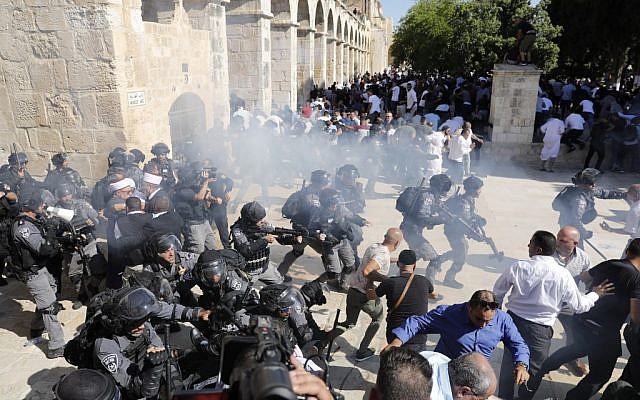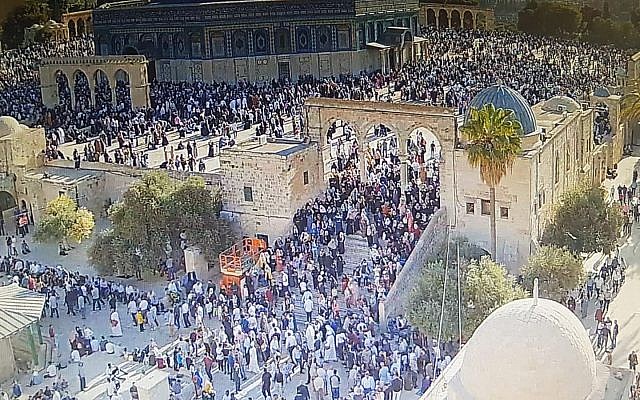Clashes broke out between Muslim protesters and Israeli police forces on Jerusalem’s Temple Mount holy site on Sunday, during a period of peak religious tensions over the confluence of Jewish and Muslim holy days.
At least 61 Muslim worshipers were injured in the clashes, according to the Red Crescent. At least four officers were also lightly-to-moderately wounded, police said.
Sunday marks both the start of Eid al-Adha, an Islamic holiday commemorating the end of the annual hajj pilgrimage to Mecca, and the Jewish fast day of Tisha B’Av, when Jews mourn the destruction of the temples that once stood on the Temple Mount and other disasters in Jewish history.
Following a security assessment, police said non-Muslims would be barred from entering the Temple Mount, where tens of thousands of Muslim worshipers had arrived during the morning. Hundreds of Jews had gathered at the gates leading to the holy site on Sunday morning.
After another security assessment, some Jewish visitors were allowed to enter the site.
Several dozen visited under close police escort and Muslim worshipers began throwing chairs and other objects at the group. The Jewish visitors left the compound shortly thereafter. Army Radio put the number of Jewish visitors at 150, and said they had been allowed a shorter-than-usual tour of the site.
Palestine TV, the official Palestinian Authority television channel, reported that the Jewish visitors entered and exited the Temple Mount within a few minutes.
According to police, Muslim worshipers began rioting and making “nationalistic calls” on the Temple Mount on Sunday morning.
In response, police fired tear gas, rubber bullets and other less-lethal riot control weapons at the protesters.


Muslim worshipers visit the Temple Mount in the Old City of Jerusalem on August 11, 2019, to mark the Islamic holiday of Eid al-Adha. (Israel Police)
On Saturday night, small-scale scuffles broke out between police and East Jerusalem Palestinians at the Damascus Gate of the Old City of Jerusalem, as an annual right-wing march around the Old City walls passed.
During the night, thousands of Jewish worshipers visited the Western Wall, the closest spot to the Temple Mount where Jews can pray, to read Lamentations and other traditional Tisha B’av liturgy.
Under an arrangement in place since Israel’s victory in the 1967 Six Day war, non-Muslims are allowed to visit the Temple Mount but not to pray there. Jews in religious garb are allowed to enter in small groups during limited hours, but are taken through a predetermined route, are closely watched and are prohibited from praying or displaying any religious or national symbols.
In a statement Friday, Grand Mufti of Jerusalem Mohammed Hussein, former grand mufti of Jerusalem Ekrima Sabri and senior Waqf official Abdel Azeem Sahlab said all mosques in Jerusalem but al-Aqsa would be closed Sunday so as many worshipers as possible would come to the compound.
They said the move was in response to police announcing they would consider allowing Jews to ascend the holy site.
“The people of Jerusalem and its surroundings will stand together in the face of the ambitions of the settlers,” they said in a statement, referring to visits by non-Muslims.
No comments:
Post a Comment